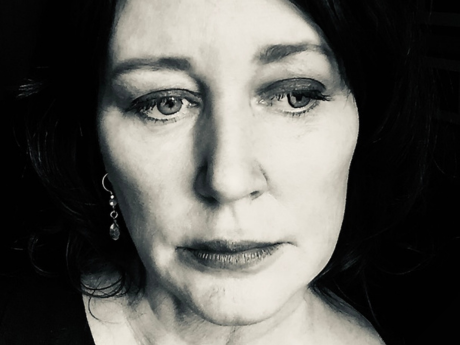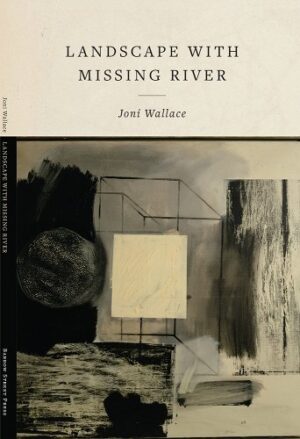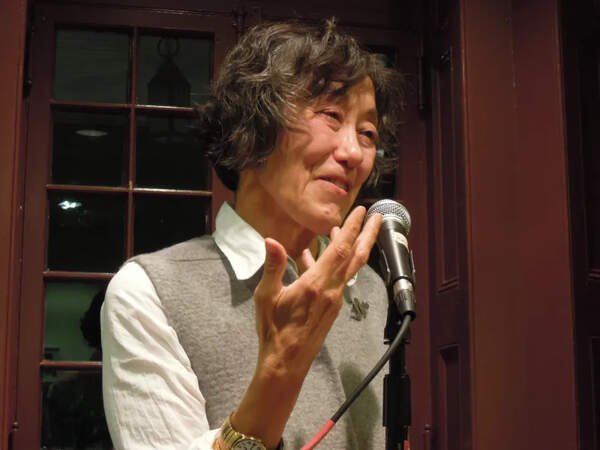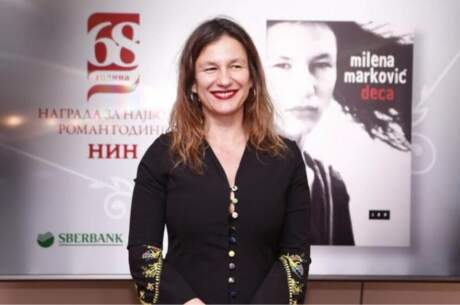Interviews
On Fathers, Dreams, Elegy, and Moths: A Conversation with Joni Wallace

Landscape with Missing River
Unearthly, you enter the stage, gradient reds
and browns, escarpments effaced by wind,
a coyote skittering into piñons. Trees lean in,
ears bent to hear the river where you lie,
I am, the two of us locked in, a tragedy’s tale
of a mad king’s machinations. The curtain falls,
you flatlined beneath a galaxy’s cold-gorgeous
pinwheel. Your crown of razored stars bright
spangling when.
I am elsewhere, awake in the desert, early
punctuated by sirens, accompaniment of dog
howls, a memory’s wolf-pitch
now time will pass me by
Plainspoken, a line delivered, your way of saying
goodbye like a problem the mind could solve.
Above the rooftop, dawn opens a pink window,
the palo verde cast in roseate glow.
Reprinted from Landscape with Missing River (Barrow Street Press). Reprinted with the permission of the author. All rights reserved.
Joni Wallace’s fourth poetry collection is Landscape with Missing River (Barrow Street Press, 2023). Her honors include Four Way Books’ Levis Prize for her second collection, Blinking Ephemeral Valentine, and fellowships from the Arizona Commission on the Arts and the Baltic Writing Residency. Work from her documentary poetry collection, Kingdom Come Radio Show, is anthologized in Privacy Policy, The Poetry of Surveillance (ed. Andrew Ridker) and has been featured by the Scottish Poetry Library and the Poetry Society of America.
Stacey Richter is an American writer of short fiction. Richter has been the recipient of four Pushcart Prizes and the National Magazine Award for fiction. She is the author of two collections of stories, My Date with Satan and Twin Study, which includes the Pushcart Award-winning story “The Land of Pain.”
SR: Your father is the central figure in your new collection, Landscape with Missing River. Let’s talk about fathers.
JW: Fathers are part of our common universes, although the family constellations present differently. Fathers are complicated. Roethke, Plath, Tate, Li-Young Lee, Kumin, Quintanilla, Covino, Olds, Levis—all write about these complexities. And many others. My own father had a protective presence. We left most things unsaid. He fell into trouble late in life. His choices felt incomprehensible, and his death felt gutting.
SR: Draw your family constellations.
JW: My father was fixed; my mother ever-shifting. My father stood between me (and my siblings) and what seemed to be total chaos. My mother had significant mental health issues. My father, a scientist, was analytical, rational, unemotional, while my mother, a musician, was depressed, suicidal, medicated, and sometimes manic. She inhabited the domestic interiors and those were not safe places to be. My father, in contrast, existed outdoors, in the natural world. That’s where I spent time with him as a kid. He built a stable and bought a couple of horses. We rode and trained them, went camping, fishing, on jeep trips to Utah. We tended rabbits, dogs, cats, turkeys, a garden. Every summer we went to my grandfather’s farm in Minnesota with lambs and tractors and fields. My father sparkles forever within those landscapes.
SR: The title poem references Shakespeare’s King Lear, a very famous story about a father. Did you mean it as a parallel?
JW: I am still figuring all the arrows of meaning of these poems. You put a book out there and it continues to reveal itself to you. But yes, there was a bit of “mad king” going on at the end of his life. When I would visit, and everything was crazy, I felt like I was in a never-ending tragical play. Something Shakespearian comes through in the most intense family moments. Lear lacked self-awareness, which led to his downfall. I never saw that in my dad when I was younger. But addiction changes us. He chose to drink even when it meant sickness, isolation, even death. He refused to acknowledge his drinking; he vehemently denied experiencing withdrawal, even though I had been through it with him, twice. It’s easy to think he just decided to go out that way. But I don’t believe that. We’re all capable of extreme self-deception.
SR: Place and the natural world are very important in this book. I’m thinking of the initial series of poems with “Landscape” titles. I remember you talking about this place (I never imagined skull cliffs, or any cliffs, behind this river, btw). What was important for you, in these poems, about this landscape?
JW: My father lived in this remote part of New Mexico—desolate and beautiful, along the Animas River, close to the town of Aztec—for the last 20 years of his life. He bought a few irrigated acres there; my mother came along in time (longer story), and he started drinking hard. Time passed. He had some falls, he got sick, he was dying. I began to make the long drive from Tucson more and more often.
When I sat down to write, just before and just after his death, I ended up in dense image territory. Not by design. But I needed to engage with the place where he lived all those years, to create a relationship with the landscape, to the creatures who lived there, to the elements, sounds, textures, smells. This is what the writing, and grief, required of me. Look and listen. Look and listen harder. First drafts of poems felt descriptive, obsessive, even documentary. I just went with it. Then windows started opening. What started as a kind of triangulation (e.g. Landscape Cut into Threes), finally began to feel expansive, revealing.
SR: I read most of the book in a day. That night I dreamt about a Sphinx moth and my cat, Maybe, trying to catch it. The dream came out of the reading. The next day, I when I went back to read the last few poems, I found the poem Clair de Lune, and in it, a piano filled with moths, which feels like a dream. How do dreams figure into your work?
JW: I love dreams. I have lucid dreams sometimes. I have really, really, vivid dreams. I have waking realizations from dreams where I solve very specific and vexing problems. People who are dead sometimes show up in super-realistic dreams. Once, Pablo Neruda walked in my door and sat on the edge of my bed and helped me memorize a poem. I love Hélène Cixous’ idea that no one can say which is more real, the waking life or the dreaming one. Dreams figure into my work often and inform poems. The Man on the Moon sequence in this book is a dream landscape. Hank Williams’ Voice springs largely from a dream.
I think our dreams are our brains translating the events of waking life into metaphor. Although visitation dreams are another sort.
SR: Can you translate my dream of the Sphinx moth?
JW: Virginia Woolf wrote about that window moth and its death throes so vividly. Annie Dillard, too, had her burning moth-as-wick scene. This is literature Western writers have internalized, I think, so the moth figure carries all this thought. Your moth dream is amazing to me because you tie it to reading the poems and literally your brain translating those. In some cultures, moths represent death or destruction, which is happening here, especially in the first part of the book. Moths are goth; perfect for any kind of personal apocalypse. Moths haunt, seeming made of dust and electricity. They are fragile and frenetic and disintegrating.
Translation: You are the cat in the dream. You are going to eat (internalize) the moth (poems). The moth is your own miniature death-star. Which dissolves into dust when touched. Not a death-star at all, but a premonition of ephemeralness.
SR: Did your father come back to you in a dream?
JW: My father came alive in dream a few days or weeks after he died. I dreamed it was the end of the world. People were running in all directions. There was green grass everywhere. It was dusk. My father appeared as an arm and a hand only. “How do I get ready?” I asked his invisible self. His hand appeared and pointed to a bracelet of white beads on the opposite arm.
I’m not religious. He was not religious. Why these bone-colored beads on a wrist? Why Walt Whitman’s grass on the hills of the apocalypse? Translation: Remember you will die. Be present, notice things, live with compassion.
This translation is not a big leap. Grass is the “beautiful uncut hair of graves,” Whitman tells us. Of course grass at the end of the world! And I remember my dying father telling a doctor that he kept his horse on the place long after he could ride because a horse is “good to look at.” He noticed things. He was present. He loved animals.
SR: Tell me about the moths. Are they lyrical devices? Actual figures? Symbols? All of the above? How do you intend them to function in the poems? I’m thinking here of
Clair de Lune.
JW: Moths lived by the river and ditch, in the grasses, and frequented the porch where my father sat outside every night of his life. Moths are winged-things, night-things, light- and moonlight-attracted things. Like ghosts, moths are otherworldly, messengers and visitations. Moths make a lot of lyrical sense for elegy. But when I was writing the poems, moths just entered the stage. Diane Seuss said about frank: sonnets, “I had a kinetic feeling.” That really resonated with me. I had an insect-buzz kind of feeling. I had a feeling of vowel-less groupings: ants, wasps, bees, moths. I had a feeling of agitation and crumbling.
When I wrote Clair de Lune, the most-moth poem in the book, I just let the actual moths do their thing. I almost cut the poem from the book. Too surreal, I thought. But then I had a realization: the light in the poem was a resurrection light. Where is the body? the light asked. Because my father was a living human being just a short while before the poem was written. Flesh and blood. Lungs, a heart, limbs. I added those rooms. The poem is a Lazarus poem which came out of circling moths because the actual holds every other thing in its presence.
SR: There’s a quality in some of these poems of extreme stillness. Is that some of the work of elegy, in your mind?
JW: What is death if not absolute stillness? Death reaches branch-like into the past, present, and future as a pooling silence. A curtain falls. Maybe there’s a little opening where we can glimpse the eternal. That’s what elegy wants. Sometimes a father can show us that much.



